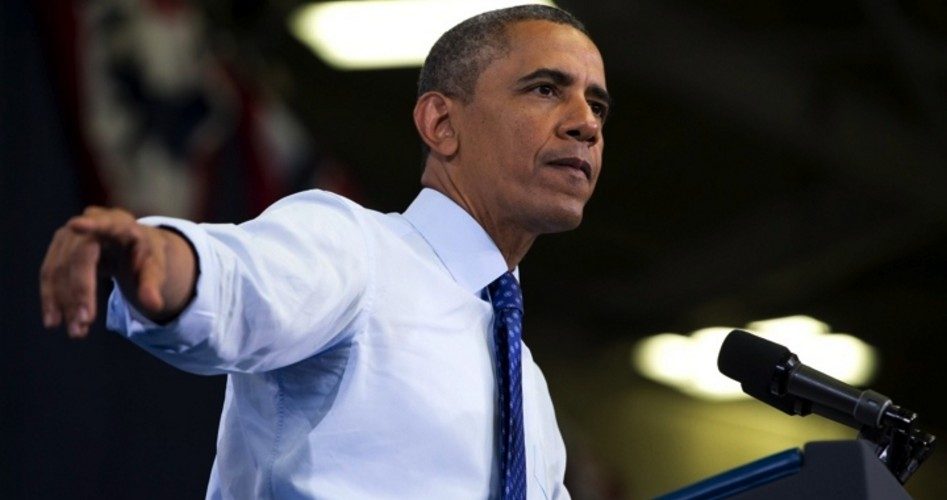
President Obama has given the green light to the shipping of weapons from the United States to opposition forces in Syria.
In a statement released by Ben Rhodes, the deputy national security advisor for strategic communications, the White House claims that “our intelligence community assesses that the Assad regime has used chemical weapons, including the nerve agent sarin.”
The Syrian government’s purported use of a chemical weapon, the president’s national security statement said, “crosses clear red lines” for the United States and the international community.
On April 26, President Obama invoked very historic words when asked about where precisely the red line was drawn.
“To use weapons of mass destruction on civilian populations crosses another line with respect to international norms and international law,” the president warned.
In a letter sent to the White House by Senators John McCain (R-Ariz.), Carl Levin (D-Mich.), and six other senators, intelligence reports were mentioned from “the French, British and Israeli governments” that corroborate claims of nerve gas deployment by Assad’s military.
The president, however, has not always been so sure.
In fact, the senators were compelled to send that letter because they felt that President Obama was waffling on his resolve to commit the United States to adding military support to the millions of dollars in financial support already sent to Syrian rebels.
A recent report by The New American reveals that there may be very good reason to doubt the “weapons of mass destruction” assertion made Thursday by the president. As The New American noted:
The “varying degrees of confidence” the Obama administration has claimed for intelligence reports of chemical weapons use by government forces in Syria may become more varied and less confident if evidence cited by a United Nations investigator is substantiated. Reuters reported from Geneva on Sunday that one member of a UN team looking into human rights violations in Syria’s two-year-old civil war said the evidence pointed to use of sarin gas by the rebel forces.
Carla Del Ponte, a former Swiss attorney general and a member of the UN independent commission of inquiry on Syria, said in a Swiss-Italian television interview that the commission’s investigations produced “strong, concrete suspicions” about the origin of the nerve-gas attack.
“Our investigators have been in neighboring countries interviewing victims, doctors and field hospitals and, according to their report of last week which I have seen, there are strong, concrete suspicions but not yet incontrovertible proof of the use of Sarin gas, from the way the victims were treated,” Del Ponte said. “This was use on the part of the opposition, the rebels, not by the government authorities,” she added.
While the United Nations has certainly not proven itself trustworthy, nor should its findings ever be accepted as persuasive by the government of the United States, the report it filed indicating possible use of sarin gas by the opposition army that the United States is now arming should be enough to give the president pause.
There, is however, an even more concrete set of facts that should cause the president to refuse to authorize sending an unidentified arsenal to the hodgepodge host of the enemies of Assad.
On August 1, 2012, Reuters reported on a secret order signed by President Obama providing support to Syrian rebel forces opposing the regime of Bashar al-Assad. Reuters wrote that “Recent news reports from the region have suggested that the influence and numbers of Islamist militants, some of them connected to al Qaeda or its affiliates, have been growing among Assad’s opponents.”
The next day, The New American covered the same story, writing that: “Western governments, brutal Sunni-Arab dictatorships, an assortment of terror groups including al-Qaeda, and other powerful interests have all been backing the uprising since long before violence even broke out last year.”
Later that same day, in a story covering the violence of the Syrian uprising, the BBC reported:
The al-Qaeda-styled group in Syria is Jabhat al-Nusra li-Ahl al-Sham (the Front for the Protection of the Syrian People).
Like other al-Qaeda affiliated groups, al-Nusra’s statements and videos are usually issued by its own media group, al-Manara al-Baida (the White Minaret) in Syria.
Al-Nusra has claimed responsibility for several attacks against the Syrian army, security and shabiha (state-sponsored thugs) since it announced its formation early this year.
Finally, under a headline reading “Al-Qaida turns tide for rebels in battle for eastern Syria,” The Guardian (U.K.) reports:
They try to hide their presence. “Some people are worried about carrying the [black] flags,” said Abu Khuder. “They fear America will come and fight us. So we fight in secret. Why give Bashar and the west a pretext?” But their existence is common knowledge in Mohassen. Even passers-by joke with the men about car bombs and IEDs [improvised explosive devices].
According to Abu Khuder, his men are working closely with the military council that commands the Free Syrian Army brigades in the region. “We meet almost every day,” he said. “We have clear instructions from our [al-Qaida] leadership that if the FSA need our help we should give it. We help them with IEDs and car bombs. Our main talent is in the bombing operations.” Abu Khuder’s men had a lot of experience in bomb-making from Iraq and elsewhere, he added.
The foregoing accounts of the hostilities in Syria provide nearly irrefutable evidence that numerous al-Qaeda militants are found among the ranks of Syrian rebels (particularly within the Free Syrian Army), including among those filling leadership roles within those forces.
Perhaps, some may argue, President Obama is not aware of the presence of al-Qaeda militants in the Syrian opposition. Unless he doesn’t talk to members of his cabinet, such an assertion is unsupportable.
At a press conference in May 2012, Secretary of Defense Leon Panetta admitted, “We do have intelligence that indicates an al-Qaeda presence in Syria.” So much for not knowing.
In light of the overwhelming evidence of the leadership role assumed by al-Qaeda over the rebel forces he has now ordered armed with American weaponry, is President Obama guilty of supporting al-Qaeda? If so, should he be subject to indefinite detention under the terms of the National Defense Authorization Act (NDAA)?
As The New American has chronicled since it was first proposed, the NDAA purportedly authorizes the president of the United States to deploy the armed forces to apprehend and indefinitely detain anyone suspected of providing support to terrorists. Section 1021 of the NDAA reads in relevant part:
Congress affirms that the authority of the President to use all necessary and appropriate force pursuant to the Authorization for Use of Military Force (Public Law 107-40; 50 U.S.C.1541 note) includes the authority for the Armed Forces of the United States to detain covered persons (as defined in subsection (b)) pending disposition under the law of war.
A covered person under this section is any person as follows:
A person who was a part of or substantially supported al-Qaeda, the Taliban, or associated forces that are engaged in hostilities against the United States or its coalition partners, including any person who has committed a belligerent act or has directly supported such hostilities in aid of such enemy forces.
And, finally:
Detention under the law of war without trial until the end of the hostilities authorized by the Authorization for Use of Military Force.
A plain reading of Section 1021 reveals, then, that anyone who is found to have “substantially supported” al-Qaeda or associated forces can be detained by the military until the end of the War on Terror.
If the laws passed by Congress apply only to the American people and not to the president or members of Congress themselves (15 senators recently voted to arm Syrian rebels), then the United States has become an aristocracy, whose ruling class is not governed by the laws they pass.
Photo of President Barack Obama: AP Images
Joe A. Wolverton, II, J.D. is a correspondent for The New American and travels frequently nationwide speaking on topics of nullification, the NDAA, and the surveillance state. He can be reached at [email protected]



